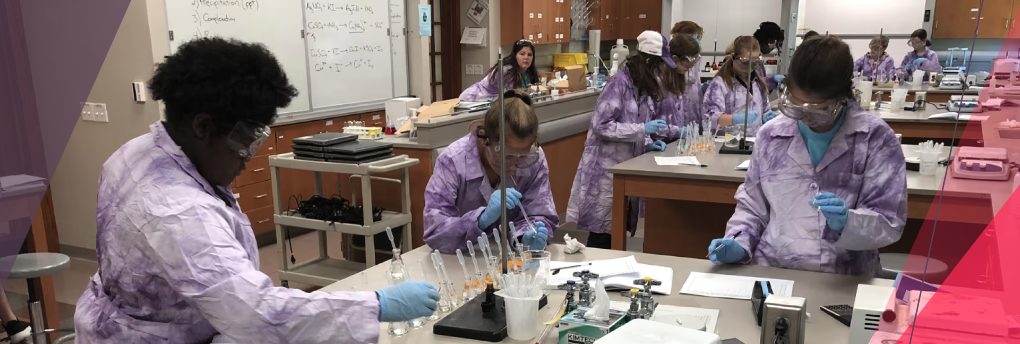Bayer: Make Way for Girls in Science!

Capturing the attention of 7-9th grade students and inspiring them to consider careers in STEM can be accomplished through role modeling, representation, and realistic experiences, according to Dr. Kelly Lane-deGraaf, associate professor of biology at Fontbonne University and creator of its Girls* in Science Program.
Role-modeling STEM is important to future innovation
STEM workers play a vital role in America’s innovative and global competitiveness, and the need to cultivate a talented STEM workforce has never been greater. One area ripe for growth is women in STEM. Although women make up nearly half of the U.S. workforce, they are still vastly underrepresented in the science, technology, engineering and math fields.
“As we celebrate International Women’s Day in March, it’s a great time to recognize organizations that promote the advancement of women into STEM roles,” says Al Mitchell, President of Bayer Fund. “Bayer Fund is proud to support Fontbonne University’s Girls in Science program. Starting early is one of the keys of this program, which seeks to pique the interest of middle school girls in science and technology.”
Role-modeling, Representation, and Realistic Experiences
Capturing the attention of 7-9th grade students and inspiring them to consider careers in STEM can be accomplished through role modeling, representation, and realistic experiences, according to Dr. Kelly Lane-deGraaf, associate professor of biology at Fontbonne University and creator of its Girls* in Science Program.
“Research shows that middle school girls lack real-life mentors in the sciences, reducing the likelihood of careers in science,” Dr. Lane-deGraaf says. “By enabling middle school students from historically excluded identities to come to a university, interact with women and other minority scientists, learn the practices of science, see experiments fail and have the opportunity to learn from those experiments, the Girls in Science program facilitates learning science in a real laboratory.”
The Girls in Science program hosts multiple 2-week residential summer camps on Fontbonne University’s campus. There are also academic-year programs, with both face-to-face and remote options for participation.
“The program is developed entirely by women scientists in their respective fields to emphasize experimental design, critical thinking, and research skills, including troubleshooting, all while experiencing a taste of college life while meeting and making friends from across the St. Louis area,” Dr. Lane-deGraaf says.
Programs in the summer of 2023 and 2023-2024 academic year will focus on Biology/Ecology (including genetics, parasitology, animal behavior, and modeling and data analysis with R); Chemistry & Physics (spectroscopy and chromatography, water chemistry, and electrochemistry); and Exercise Science (including kinesiology, sports nutrition, and analyses of fitness).
Growing STEM Participation
Dr. Lane-deGraaf launched Girls in Science in 2015 with 5 girls and no funding. Since that time, thanks to annual grants from Bayer Fund, the program has grown tremendously – expanding its reach to approximately 500 girls in 2020/2021.
Pre- and post-surveys from the program consistently demonstrate that girls show:
- Increased interest in careers in science (5-year average: from 35% to 92%)
- Increased thinking of science as fun (5-year average: from 48% to 100%)
- Increased thinking of science as accessible (5-year average: from 46% to 100%)
- Increased comfort with making 'mistakes' (5-year average: from 18% to 83%).
“In 2020, our first cohort of Girls in Science participants entered college, and follow-up surveys show that they are actively pursuing careers in science – 2 reporting interest in attending medical school; 2 in attending schools of veterinary medicine; 1 in civil engineering; and 1 in attending graduate school in genetics!” says Dr. Lane-deGraaf.
As the world becomes increasingly technical, investing in STEM experiences for young women pays big dividends for their futures, and for our future too.

